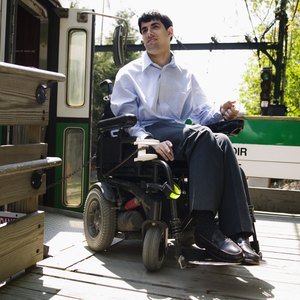
If you are a disabled individual with a low income, assistance is available through federal, local, and nonprofit organizations. Although most federal lump-sum grants are only available to nonprofit agencies, there are still programs specifically offered to people with disabilities and limited resources. Depending on your disability, the help may be long term or available temporarily. If you have not been declared disabled by the Social Security Administration, you will generally need to provide documented proof of your disability from a physician or psychologist.
Supplemental Security Income
If you are fully disabled, you can apply for Social Security Disability Insurance or SSI. Benefits are based on the amount of money you made within a certain number of years, which may vary depending on the based you become disabled. If you do not have enough work credits to qualify for benefits or have been approved for a very low amount, you may qualify for SSI. The more income you have, the less your SSI benefit will be. As of 2013, the maximum SSI monthly benefit amount is $710 per month. According to the Social Security Administration, if you are approved for SSI, most states also automatically approve you for healthcare coverage through Medicaid. Unlike Medicare, Medicaid does not have monthly premiums, co-pays or deductibles to meet. You can begin your application by contacting the Social Security Administration. Submit an application online or at a local Social Security office.
Prescription Assistance
The Partnership for Prescription Assistance is a nonprofit organization that helps people without prescription coverage get the medicine at a reduced cost of free of charge. For people who have coverage but cannot afford the co-pays, there are programs available to pick up the costs. The Partnership for Prescription Assistance provides access to federal and private programs offering help for specific disabilities and diseases. Although specific requirements vary depending on the program, applicants are required to demonstrate financial need to qualify for prescription assistance.
Energy Assistance
The Low Income Home Energy Assistance Program offers federally funded assistance to help with the costs of weatherization and energy bills. Through the program, you can receive assistance to make your home more energy efficient. The program will pay for repairs, such as broken heating equipment and leaking lines. You can apply for a cash grant to pay your heating or cooling costs if you are in danger of losing electric or gas. If your services are currently disconnected, you can apply for expedited crisis help. Income requirements are based on the area median income and number of people in the household. States administer the LIHEAP program. Visit the U.S. Department of Health and Human Services for information on the program requirements in your state. You can also contact the United Way's 2-1-1 hotline to receive information on state-specific energy assistance programs. The United Way can also help connect you to nonprofit organizations that provide emergency energy assistance grants, such as Catholic Charities and the Salvation Army.
Housing Assistance
The U.S. Department of Housing and Urban Development issues grants to local Public Housing Authorities. Through your local PHA, you can apply for help with your monthly rent. Subsidized housing allows disabled individuals to rent apartments at a reduced rate. The apartment owners are compensated by HUD for offering units below the market rate. You can find a list of subsidized apartments for disabled individuals through the HUD website. You must contact the apartment directly to submit an application. If you want to rent a private home, you can apply for a Housing Choice Voucher. For non-elderly people with disabilities, HUD also has a Certain Developments Voucher program and a Designated Housing Voucher program. Applicants must have a low to very-low income to qualify for housing assistance. Income limits are based on the area median income. If approved for a subsidized apartment or housing voucher, you are expected to contribute 30 percent of your income towards the rent. HUD pays the remainder of the monthly rent.
References
- Social Security Administration: SSI Federal Payment Amounts for 2013
- Social Security Administration: The TANF/SSI Connection
- PPL Electric Utilities: Low-Income Home Energy Assistance Program
- U.S. Department of Health and Human Services: Help for Communities & Families
- Disability Secrets: Does the Social Security Disability Program Offer Any Help With Housing?
- HUD: Certain Developments Vouchers
- Partnership for Prescription Assistance: Prescription Assistance Programs
Resources
Writer Bio
Jeannine Mancini, a Florida native, has been writing business and personal finance articles since 2003. Her articles have been published in the Florida Today and Orlando Sentinel. She earned a Bachelor of Science in Interdisciplinary Studies from the University of Central Florida.

